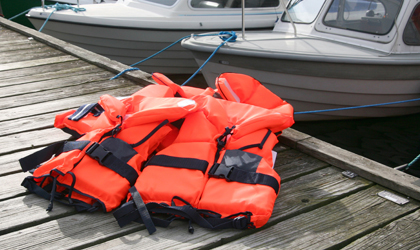The unofficial start to summer is here, which means people will be hitting the lakes on their boats and jet skis and swimming.
Lt. Frank Reger, with the Louisiana Department of Wildlife and Fisheries, said the most important thing to remember when boating is to have enough life jackets for all occupants and to wear them.
“Everybody on board is required to wear a life jacket that is sized to fit them,” he said. “It must be readily accessible. Everyone in a tiller-operated boat under 16 feet in length are required to wear a life jacket at all times, no matter your age.”
He said children aged 17 or younger must wear a life jacket at all times while the boat motor is running, no matter the size of the boat or the type of motor.
Any boat that is under power is required to be registered with the state.
“So once you receive your paperwork, you need to keep a copy of registration on your vessel at all times,” he said.
From sunset until sunrise, boats are required to have proper lighting, including the display the red and green bow light – red to the left, green to the right – and a
white light at the stern of the boat.
“It must be visible 360 degrees,” he said. “It has to be above anything in the boat.”
The rules of the road apply to the water, he said. If traveling by boat on a river or bayou, boaters must stay to the right side. Drinking and driving is prohibited on a boat. If a person is caught by law enforcement, they will get a DWI, just like they would if they were pulled over in a vehicle on the road, Reger said.
“You can lose your driving privileges,” he said. “If your license is suspended, that means you can’t drive anything on the water, and that includes jet skis.”
Anyone born after Jan. 1, 1984, is required to pass a boating safety education course to operate anything larger than a 10-horsepower motor. To operate a jet ski, a person must be 16 years of age and taken and passed the boater safety education course.
When swimming, the American Red Cross offers tips to keep families safe while having a good time:
Swim in designated areas supervised by lifeguards.
Always swim with a buddy; do not allow anyone to swim alone.
Never leave a young child unattended near water and do not trust a child’s life to another child; teach children to always ask permission to go near water.
Have young children or inexperienced swimmers wear U.S. Coast Guard-approved life jackets around water.
Avoid distractions when supervising children around water.
Protect your skin. Limit the amount of direct sunlight you receive between 10 a.m. and 4 p.m., and wear sunscreen with a protection factor of at least 15.
Leger said the ultimate goal is to be safe while having fun.
“We want everyone to have fun while boating and swimming,” he said. “But the number one thing is to have a life jacket and carry enough for everyone on board.”




